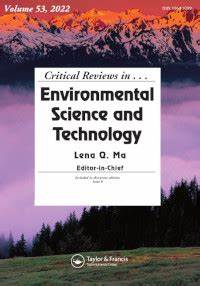粉煤灰去除废水中有毒金属和酚类污染物的研究进展
IF 11.4
1区 环境科学与生态学
Q1 ENVIRONMENTAL SCIENCES
Critical Reviews in Environmental Science and Technology
Pub Date : 2023-05-05
DOI:10.1080/10643389.2023.2206781
引用次数: 0
摘要
在过去的几年里,人口增长、工业进步和气候变化导致了水资源短缺。因此,有毒金属、酚类化合物等有害可溶性和不溶性污染物对水体的污染已成为亟待解决的重要问题。例如,已采用新方法将低成本原料(即煤飞灰和煤底灰“废物转化为资源”)转化为新的清洁生产的适当材料,以实现含有毒金属和酚类化合物净化废水的可持续性目标。粉煤灰和底灰的功能化明显增强了粉煤灰基实体作为废水修复技术中潜在材料的能力。本文综述了粉煤灰,包括煤底灰和粉煤灰基材料在去除有毒金属和酚类化合物方面的应用。我们还研究了它们的结构性质和功能化,以增强它们在水环境中对这些污染物的亲和力。尽管每一种方法都有自己的优点和局限性,但煤灰基材料似乎很有希望通过吸附、膜过滤和光催化去除有毒金属和酚类化合物。总的来说,粉煤灰和底灰用于废水处理的可行性研究已经取得了对有毒金属和酚类化合物的高去除效率。今后应进一步研究粉煤灰作为新型净水剂的回收利用新方法,探索先进工艺,以达到废水的修复目的。图形抽象本文章由计算机程序翻译,如有差异,请以英文原文为准。
Coal ash for removing toxic metals and phenolic contaminants from wastewater: A brief review
Abstract Over the past few years, population growth, industrial progress and climate change have led to water scarcity. Thus, water pollution caused by hazardous soluble and insoluble pollutants, such as toxic metals and phenolic compounds, has become an important problem that should be dealt with urgently. For instance, new methods have been introduced to convert low-cost raw materials (i.e. coal fly ash and coal bottom ash “wastes-to-resource”) into suitable materials for new cleaner production to achieve sustainability goals in wastewater-containing toxic metals and phenolic compounds purification. Obviously, the functionalization of coal fly ash and bottom ash enhances the ability of coal ash-based entities as potential materials in wastewater remediation technologies. Here, we review the application of coal ashes, including coal bottom ash and fly ash-based materials for toxic metals and phenolic compounds removal. We also examine their structural properties and functionalization to enhance their affinities toward these pollutants in aqueous environment. Even though each process has its own benefits and limitations, coal ash-based materials appear promising for the removal of toxic metals and phenolic compounds using adsorption, membrane filtration, and photocatalysis. Overall, the study on the availability of coal fly ash and bottom ash for wastewater treatment have resulted in high removal efficiencies for toxic metals and phenolic compounds. In the future, new recycling methods for coal ashes as new water purification agents should be further studied and advanced processes should be investigated in order to achieve wastewater remediation purposes. Graphical abstract
求助全文
通过发布文献求助,成功后即可免费获取论文全文。
去求助
来源期刊
CiteScore
27.30
自引率
1.60%
发文量
64
审稿时长
2 months
期刊介绍:
Two of the most pressing global challenges of our era involve understanding and addressing the multitude of environmental problems we face. In order to tackle them effectively, it is essential to devise logical strategies and methods for their control. Critical Reviews in Environmental Science and Technology serves as a valuable international platform for the comprehensive assessment of current knowledge across a wide range of environmental science topics.
Environmental science is a field that encompasses the intricate and fluid interactions between various scientific disciplines. These include earth and agricultural sciences, chemistry, biology, medicine, and engineering. Furthermore, new disciplines such as environmental toxicology and risk assessment have emerged in response to the increasing complexity of environmental challenges.
The purpose of Critical Reviews in Environmental Science and Technology is to provide a space for critical analysis and evaluation of existing knowledge in environmental science. By doing so, it encourages the advancement of our understanding and the development of effective solutions. This journal plays a crucial role in fostering international cooperation and collaboration in addressing the pressing environmental issues of our time.

 求助内容:
求助内容: 应助结果提醒方式:
应助结果提醒方式:


